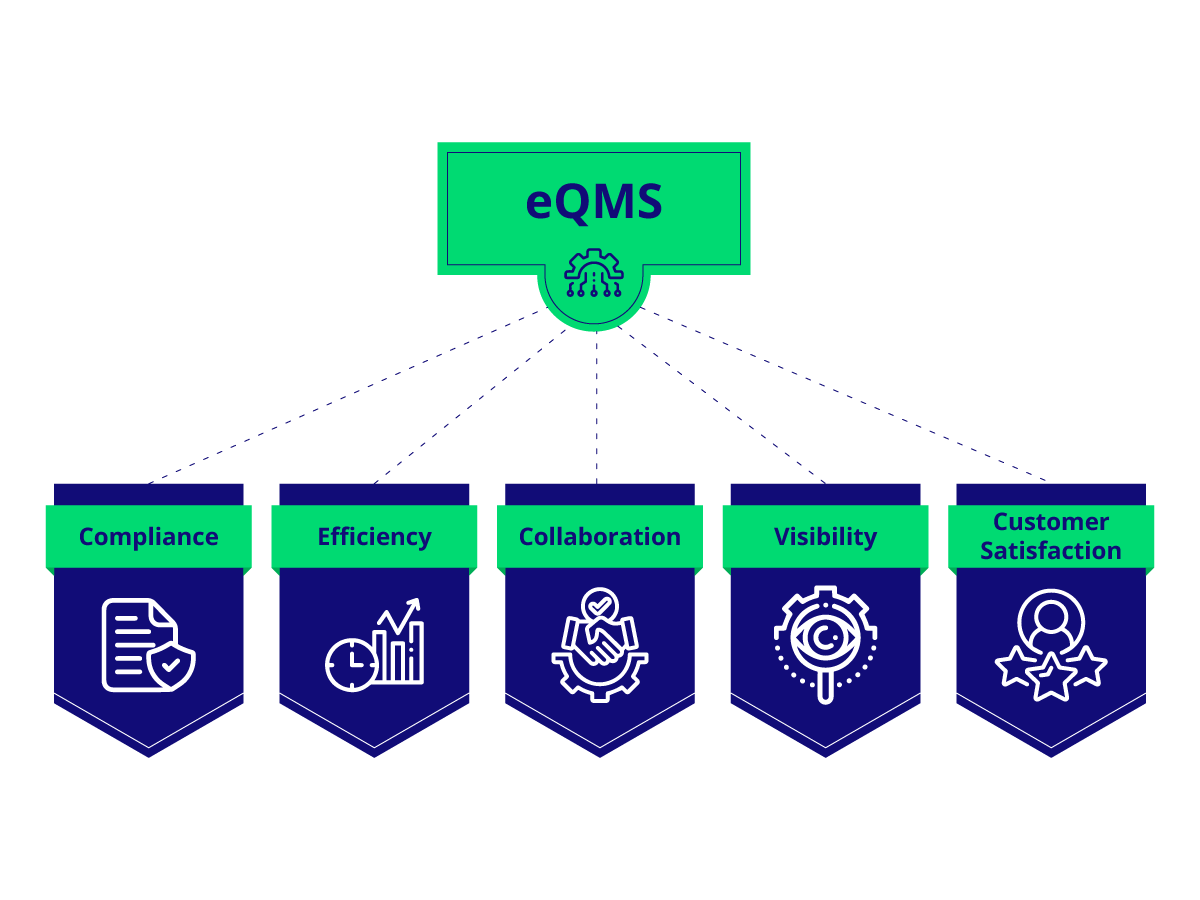Electronic Quality Management System (eQMS)
An Electronic Quality Management System (eQMS) is software that helps organizations manage and maintain their quality management processes electronically. Its primary goal is to help organizations meet industry standards and regulatory requirements while improving the quality of their products.
What are the Functionalities of an eQMS?

An eQMS offers several core functionalities to enhance quality management:
- Compliance: Ensures adherence to industry standards and regulatory requirements.
- Efficiency: Automates and streamlines quality management processes.
- Collaboration: Facilitates teamwork and communication between departments.
- Visibility: Provides improved oversight into quality processes.
- Customer Satisfaction: Enhances customer satisfaction by ensuring high-quality products.
Unlike traditional QMS, an eQMS operates on software or cloud servers, offering real-time updates and remote accessibility.
The Shift from Paper-Based QMS to eQMS
Traditional paper-based QMS involves time-consuming manual processes, challenges in document retrieval, and a high risk of human error in data entry and tracking. In contrast, eQMS automates repetitive tasks such as document routing and approval, provides easy access to documents through centralized digital storage, and reduces human error with automated data entry and validation. Additionally, eQMS enhances data security with encryption and access controls, ensures reliable audit trails and version control, and offers secure backups and disaster recovery options.
For compliance and regulatory adherence, eQMS streamlines audit preparation, provides real-time updates to policies and procedures, and performs automated compliance checks. It also improves communication with cloud-based access for remote teams, provides faster communication through integrated messaging and notification systems, provides real-time visibility into process status, and facilitates quicker decision-making.
What Makes a Good eQMS?
A good eQMS features a user-friendly interface and includes modules for common QMS branches, such as training, design control, risk management, change control, and audits. The choice of an eQMS often depends on the organization’s budget and specific preferences.
Compliance with FDA 21 CFR Part 11 and EU Annex 11
A robust eQMS must ensure compliance with regulations like FDA 21 CFR Part 11 and EU Annex 11. This includes secure electronic records, compliant electronic signatures, and reliable audit trails. Common software solutions meeting these standards include SharePoint, Google Drive, and DocuSign, alongside traditional eQMS platforms.
How to Choose an eQMS Software?
When selecting an eQMS software, consider the following key factors:
- Regulatory Requirements: Ensure the eQMS complies with relevant regulatory bodies like FDA 21 CFR Part 11 and EU Annex 11.
- Validation: The eQMS should be validated to demonstrate consistent and reliable performance, with ongoing support from the vendor for system updates.
- Data Security and Integrity: Implement strong data security measures, including encryption, access controls, and secure backups. Ensure data integrity through audit trails, version control, and change tracking.
- Record Retention and Retrieval: The eQMS should support regulatory requirements for record retention, ensuring secure storage and efficient retrieval.
- Integration with Existing Systems: Assess compatibility with existing IT infrastructure and other enterprise systems, ensuring seamless data exchange and avoiding data silos.
- Scalability: Choose an eQMS that can scale with organizational growth and adapt to evolving business needs.
- User Training: Develop comprehensive training programs for different user roles, offering initial and ongoing training sessions to keep users updated on new features and best practices.
- User Adoption: Engage employees early in the transition process, provide hands-on training, and ensure access to adequate resources like user manuals and help desks for ongoing support.
Learn More About Quality Management Systems
Discover how Rook Quality Systems, your Medical Device Quality Consultants, can create a custom QMS for your company that is both efficient and easy to maintain for your product and scope. Our systems are audit-ready and continually updated to ensure compliance with effective regulations.